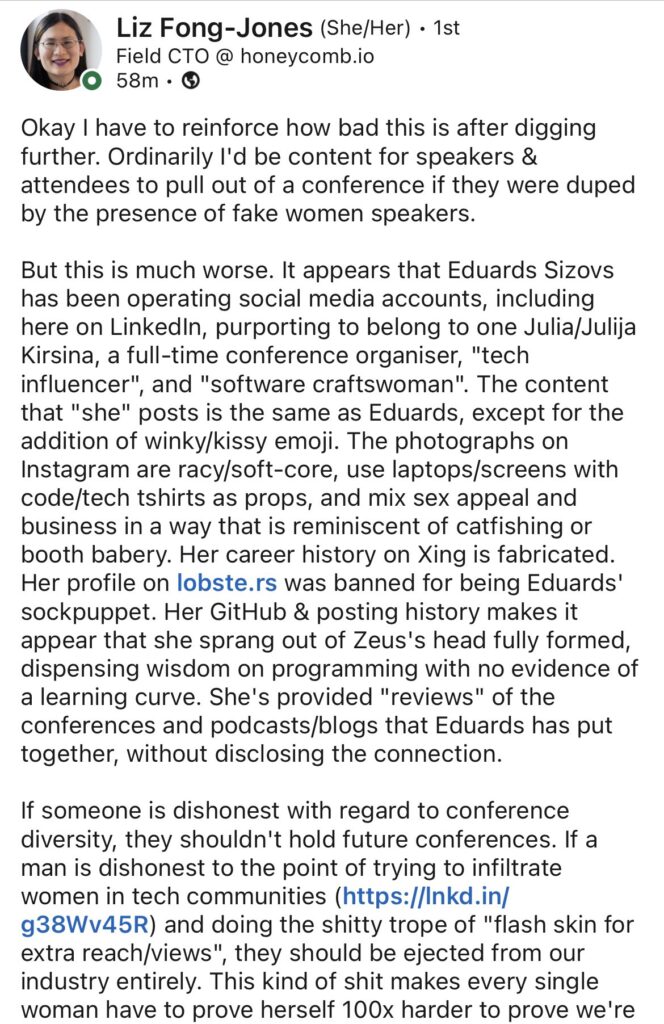A tech conference in Latvia has been called out for adding the name of a woman that doesn’t exist to its list of event speakers. The sexist attempt at faking diversity raises the question of how many other events might be attempting the same.
As founder of Women of Web3 Lauren Ingram puts it, the revelation is a “wake up call” that women are at risk of being left behind in the next iteration of the internet.
Developer conference DevTernity posted a photo of a woman under the name ‘Anna Boyko’ to their event website. She was listed as a staff engineer at Coinbase and a core contributor at Ethereum.
The problem is that she’s never spoken at any events and her supposed employer, Coinbase, had never heard of her. She was a fake profile listed on a prominent conference website.
The detective behind this discovery is a Netherlands-based software engineer, Gergely Orosz, who noticed the discrepancies and reached out to verify with other speakers from the conference, all of whom had never heard of an ‘Anna Boyko’.
In a detailed thread on platform X (formerly Twitter), Gergely Orosz lays out the series of events leading to the discovery of the fake profile.
“To spell it out why this conference generated fake women speakers. Because the organiser wants big names and it probably seemed like an easy way to address their diversity concerns,” writes Orosz.
Adding to the disgrace, Orosz points out that Boyko was not the only fake profile that the conference group had created. Of the 3 women speakers initially listed at the event, two of the women were fake profiles. The second woman, Alina Prokhoda, who is listed as a Senior Engineer at WhatsApp, also doesn’t exist.
Another woman listed on DevTernity’s website (before it was taken down) was ‘Anna Boyle’s’ colleague Natalie Stadler– a fake person.
Orosz also shares images of the website’s edit history as evidence of when the organisers created the fake Anna and subsequently removed her– 10 months after ticket sales had been ongoing.
And at conferences from 2021 to 2023, DevTernity listed the fake profile Julia Kirsina using photos from a real person (a model who is not a software engineer).
Adding to the discourse, Field CTO at honeycomb.io Liz Fong-Jones has called the story behind ‘Julia Kirsina’s’ fake profile “much worse” than it first appears.
Fong-Jones says that the founder of DevTernity, Eduards Sizovs has been operating social media accounts pretending to belong to Julia Kirsina, a full-time conference organiser, “tech influencer” and “software craftswoman”.
“The content that ‘she’ posts is the same as Eduards, except for the addition of winky/kissy emoji,” writes Fong-Jones.
“The photographs on Instagram are racy/soft-core, use laptops/screens with code/tech tshirts as props, and mix sex appeal and business in a way that is reminiscent of catfishing or booth babery.”
Fong-Jones goes on to say that “if a man is dishonest to the point of trying to infiltrate women in tech communities” then he should be “ejected” from the industry entirely.
“This kind of shit makes every single woman have to prove herself 100x harder to prove we’re not a ‘fake’ and that we got to where we are through hard work, not through sexy pics/flirting.”

The fallout
As these disturbing revelations continue to come to light, several people signed up to speak at the DevTernity conference have pulled out, and yet organisers of the event have continued to deny the problem of creating fake female speakers.
Some speakers have even had trouble getting event organisers to remove their profile from the website after asking to be taken off the list.
Support for Sizovs’ DevTernity has been rapidly collapsing as 404 Media reports that the last woman speaker, Kristine Howard of Amazon Web Services (a real person) scheduled for the conference has pulled out.
Rather than take accountability for wrongdoing as the evidence mounts, Sizovs has issued statements blaming ‘cancel culture’ for ruining ‘all the good work’ he’s been doing.
“I said it was a mistake, a bug that turned out to be a feature. I even fixed that on my website! We’re cool? Nooooo, we want blood! Let’s cancel this SINNER!,” writes Sizovs in his response to the situation.


